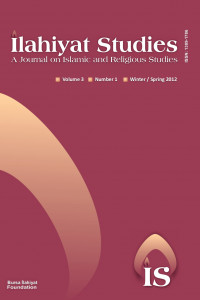The Nature of Royal Authority (Mulk) in the context of Continuity and Mutability in Ibn Khaldūn’s Thought
Abstract
The basic claim of Ibn Khaldūn in his Muqaddima is that there must be a theoretical frame that corresponds to facts about state and society qua they are state and society to make a correct analysis about a given state and society. What Ibn Khaldūn’s theory of royal authority (mulk) provides is an accurate analysis of state and society as they exist. Accordingly the conceptual frame analyzes the essence of civilization and the accidental changes in a royal authority and state that occur at any time and space that do not change the essence of them. But the premises about the nature and the essence can be determined according to their matters, not to their reasonable consistencies of accuracy and fallacy. Ibn Khaldūn, thus, balances the constants and variables. In this article, after analyzing Ibn Khal-dūn’s theory of royal authority in its own philosophical context, I discuss the metaphysical assumptions of this theory.
References
- Arslan, Ahmet, İbn Haldûn'un İlim ve Fikir Dünyası [Ibn Khaldūn's World of Thought] (Ankara: Vadi Yayınları, 1997).
- Alatas, Syed Farid, "A Khaldunian Perspective on the Dynamics of Asiatic Societies," Comparative Civilizations Review 29 (1993), 29-51.
- Alatas, Syed Farid, "A Khaldunian Exemplar for a Historical Sociology for the South," Current Sociology LIV/3 (2006), 397-411.
- al-Fārābī, Abū Naṣr Muḥammad ibn Muḥammad ibn Ṭarkhān, Kitâbu'l-Burhân [Kitāb al-Burhān] (translated into Turkish by Ömer Türker and Ömer Mahir Alper; Istanbul: Klasik Yayınları, 2008).
- Görgün, Tahsin, "İbn Haldûn: Görüşleri [Ibn Khaldūn: His Ideas]," Türkiye Diyanet Vakfı İslâm Ansiklopedisi (DİA) [Turkish Religious Foundation Encyclopedia of Islam], XIX, 543-555.
- Ibn Khaldūn, Abū Zayd ʿAbd al-Raḥmān ibn Muḥammad, Muqaddimat Ibn Khaldūn (ed. Darwīsh al-Juwaydī; 2nd ed., Ṣaydā, Beirut: al-Maktaba al-ʿAṣriyya, 1996).
- Ibn Sīnā, Abū ʿAlī al-Ḥusayn ibn ʿAbd Allāh ibn ʿAlī, Kitâbu'ş-Şifâ: Mantığa Giriş [=Kitāb al-Shifāʾ: al-Madkhal] (translated into Turkish by Ömer Türker; Istanbul: Litera Yayınları, 2006).
- Ibn Sīnā, Abū ʿAlī al-Ḥusayn ibn ʿAbd Allāh ibn ʿAlī, Kitâbu'ş-Şifâ: II. Analitikler [=Kitāb al-Shifāʾ: al-Burhān] (translated into Turkish by Ömer Türker; Istanbul: Litera Yayıncılık, 2006).
- İslâm Araştırmaları Dergisi [Turkish Journal of Islamic Studies] 16 (İbn Haldun Özel Sayısı II [Special Issue: Ibn Khaldūn II]) (2006).
- Korkut, Şenol, "İbn Haldûn'un 'es-Siyâsetü'l-medeniyye' Teorisini Eleştirisi [Ibn Khaldūn's Critique of the Theory of 'al-Siyāsa al-madaniyya']," İslâm Araştırmaları Dergisi [Turkish Journal of Islamic Studies] 15 (İbn Haldun Özel Sayısı I [Special Issue: Ibn Khaldūn I]) (2006), 115-140.
- Mahdi, Muhsin, Ibn Khaldûn's Philosophy of History: A Study in the Phi-losophic Foundation of the Science of Culture (Chicago: The Uni-versity of Chicago Press, 1964).
- Tomar, Cengiz, "İbn Haldûn: Literatür [Ibn Khaldūn: Literature]," Türkiye Diyanet Vakfı İslâm Ansiklopedisi (DİA) [Turkish Religious Foundation Encyclopedia of Islam], XX, 8-12.
- Türker, Ömer, "The Perception of Rational Sciences in the Muqaddimah: Ibn Khaldūn's Individual Aptitudes Theory," Asian Journal of Social Science XXXVI/3-4 (Special Focus: Ibn Khaldun) (2008), 465-482.
The Nature of Royal Authority (Mulk) in the context of Continuity and Mutability in Ibn Khaldūn’s Thought
Abstract
Keywords
Ibn Khaldūn royal authority (mulk) ʿaṣabiyya maṣlaḥa Ibn Khaldūn, royal authority (mulk), ʿaṣabiyya, maṣlaḥa
References
- Arslan, Ahmet, İbn Haldûn'un İlim ve Fikir Dünyası [Ibn Khaldūn's World of Thought] (Ankara: Vadi Yayınları, 1997).
- Alatas, Syed Farid, "A Khaldunian Perspective on the Dynamics of Asiatic Societies," Comparative Civilizations Review 29 (1993), 29-51.
- Alatas, Syed Farid, "A Khaldunian Exemplar for a Historical Sociology for the South," Current Sociology LIV/3 (2006), 397-411.
- al-Fārābī, Abū Naṣr Muḥammad ibn Muḥammad ibn Ṭarkhān, Kitâbu'l-Burhân [Kitāb al-Burhān] (translated into Turkish by Ömer Türker and Ömer Mahir Alper; Istanbul: Klasik Yayınları, 2008).
- Görgün, Tahsin, "İbn Haldûn: Görüşleri [Ibn Khaldūn: His Ideas]," Türkiye Diyanet Vakfı İslâm Ansiklopedisi (DİA) [Turkish Religious Foundation Encyclopedia of Islam], XIX, 543-555.
- Ibn Khaldūn, Abū Zayd ʿAbd al-Raḥmān ibn Muḥammad, Muqaddimat Ibn Khaldūn (ed. Darwīsh al-Juwaydī; 2nd ed., Ṣaydā, Beirut: al-Maktaba al-ʿAṣriyya, 1996).
- Ibn Sīnā, Abū ʿAlī al-Ḥusayn ibn ʿAbd Allāh ibn ʿAlī, Kitâbu'ş-Şifâ: Mantığa Giriş [=Kitāb al-Shifāʾ: al-Madkhal] (translated into Turkish by Ömer Türker; Istanbul: Litera Yayınları, 2006).
- Ibn Sīnā, Abū ʿAlī al-Ḥusayn ibn ʿAbd Allāh ibn ʿAlī, Kitâbu'ş-Şifâ: II. Analitikler [=Kitāb al-Shifāʾ: al-Burhān] (translated into Turkish by Ömer Türker; Istanbul: Litera Yayıncılık, 2006).
- İslâm Araştırmaları Dergisi [Turkish Journal of Islamic Studies] 16 (İbn Haldun Özel Sayısı II [Special Issue: Ibn Khaldūn II]) (2006).
- Korkut, Şenol, "İbn Haldûn'un 'es-Siyâsetü'l-medeniyye' Teorisini Eleştirisi [Ibn Khaldūn's Critique of the Theory of 'al-Siyāsa al-madaniyya']," İslâm Araştırmaları Dergisi [Turkish Journal of Islamic Studies] 15 (İbn Haldun Özel Sayısı I [Special Issue: Ibn Khaldūn I]) (2006), 115-140.
- Mahdi, Muhsin, Ibn Khaldûn's Philosophy of History: A Study in the Phi-losophic Foundation of the Science of Culture (Chicago: The Uni-versity of Chicago Press, 1964).
- Tomar, Cengiz, "İbn Haldûn: Literatür [Ibn Khaldūn: Literature]," Türkiye Diyanet Vakfı İslâm Ansiklopedisi (DİA) [Turkish Religious Foundation Encyclopedia of Islam], XX, 8-12.
- Türker, Ömer, "The Perception of Rational Sciences in the Muqaddimah: Ibn Khaldūn's Individual Aptitudes Theory," Asian Journal of Social Science XXXVI/3-4 (Special Focus: Ibn Khaldun) (2008), 465-482.
Details
| Primary Language | English |
|---|---|
| Subjects | Religious Studies |
| Journal Section | Research Articles |
| Authors | |
| Publication Date | September 29, 2012 |
| Submission Date | April 13, 2012 |
| Published in Issue | Year 2012 Volume: 3 Issue: 1 |

